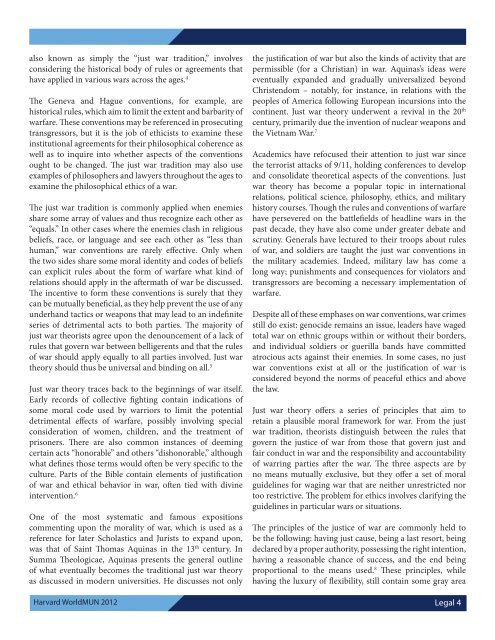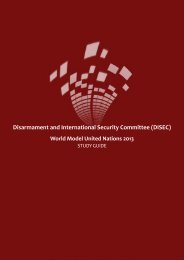Legal Committee - World Model United Nations
Legal Committee - World Model United Nations
Legal Committee - World Model United Nations
Create successful ePaper yourself
Turn your PDF publications into a flip-book with our unique Google optimized e-Paper software.
also known as simply the “just war tradition,” involves<br />
considering the historical body of rules or agreements that<br />
have applied in various wars across the ages. 4<br />
The Geneva and Hague conventions, for example, are<br />
historical rules, which aim to limit the extent and barbarity of<br />
warfare. These conventions may be referenced in prosecuting<br />
transgressors, but it is the job of ethicists to examine these<br />
institutional agreements for their philosophical coherence as<br />
well as to inquire into whether aspects of the conventions<br />
ought to be changed. The just war tradition may also use<br />
examples of philosophers and lawyers throughout the ages to<br />
examine the philosophical ethics of a war.<br />
The just war tradition is commonly applied when enemies<br />
share some array of values and thus recognize each other as<br />
“equals.” In other cases where the enemies clash in religious<br />
beliefs, race, or language and see each other as “less than<br />
human,” war conventions are rarely effective. Only when<br />
the two sides share some moral identity and codes of beliefs<br />
can explicit rules about the form of warfare what kind of<br />
relations should apply in the aftermath of war be discussed.<br />
The incentive to form these conventions is surely that they<br />
can be mutually beneficial, as they help prevent the use of any<br />
underhand tactics or weapons that may lead to an indefinite<br />
series of detrimental acts to both parties. The majority of<br />
just war theorists agree upon the denouncement of a lack of<br />
rules that govern war between belligerents and that the rules<br />
of war should apply equally to all parties involved. Just war<br />
theory should thus be universal and binding on all. 5<br />
Just war theory traces back to the beginnings of war itself.<br />
Early records of collective fighting contain indications of<br />
some moral code used by warriors to limit the potential<br />
detrimental effects of warfare, possibly involving special<br />
consideration of women, children, and the treatment of<br />
prisoners. There are also common instances of deeming<br />
certain acts “honorable” and others “dishonorable,” although<br />
what defines those terms would often be very specific to the<br />
culture. Parts of the Bible contain elements of justification<br />
of war and ethical behavior in war, often tied with divine<br />
intervention. 6<br />
One of the most systematic and famous expositions<br />
commenting upon the morality of war, which is used as a<br />
reference for later Scholastics and Jurists to expand upon,<br />
was that of Saint Thomas Aquinas in the 13 th century. In<br />
Summa Theologicae, Aquinas presents the general outline<br />
of what eventually becomes the traditional just war theory<br />
as discussed in modern universities. He discusses not only<br />
the justification of war but also the kinds of activity that are<br />
permissible (for a Christian) in war. Aquinas’s ideas were<br />
eventually expanded and gradually universalized beyond<br />
Christendom – notably, for instance, in relations with the<br />
peoples of America following European incursions into the<br />
continent. Just war theory underwent a revival in the 20 th<br />
century, primarily due the invention of nuclear weapons and<br />
the Vietnam War. 7<br />
Academics have refocused their attention to just war since<br />
the terrorist attacks of 9/11, holding conferences to develop<br />
and consolidate theoretical aspects of the conventions. Just<br />
war theory has become a popular topic in international<br />
relations, political science, philosophy, ethics, and military<br />
history courses. Though the rules and conventions of warfare<br />
have persevered on the battlefields of headline wars in the<br />
past decade, they have also come under greater debate and<br />
scrutiny. Generals have lectured to their troops about rules<br />
of war, and soldiers are taught the just war conventions in<br />
the military academies. Indeed, military law has come a<br />
long way; punishments and consequences for violators and<br />
transgressors are becoming a necessary implementation of<br />
warfare.<br />
Despite all of these emphases on war conventions, war crimes<br />
still do exist: genocide remains an issue, leaders have waged<br />
total war on ethnic groups within or without their borders,<br />
and individual soldiers or guerilla bands have committed<br />
atrocious acts against their enemies. In some cases, no just<br />
war conventions exist at all or the justification of war is<br />
considered beyond the norms of peaceful ethics and above<br />
the law.<br />
Just war theory offers a series of principles that aim to<br />
retain a plausible moral framework for war. From the just<br />
war tradition, theorists distinguish between the rules that<br />
govern the justice of war from those that govern just and<br />
fair conduct in war and the responsibility and accountability<br />
of warring parties after the war. The three aspects are by<br />
no means mutually exclusive, but they offer a set of moral<br />
guidelines for waging war that are neither unrestricted nor<br />
too restrictive. The problem for ethics involves clarifying the<br />
guidelines in particular wars or situations.<br />
The principles of the justice of war are commonly held to<br />
be the following: having just cause, being a last resort, being<br />
declared by a proper authority, possessing the right intention,<br />
having a reasonable chance of success, and the end being<br />
proportional to the means used. 8 These principles, while<br />
having the luxury of flexibility, still contain some gray area<br />
Harvard <strong>World</strong>MUN 2012 <strong>Legal</strong> 44

















